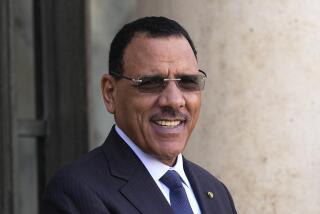Egypt unrest: U.S. envoy presses for inclusive transition
CAIRO -- A top U.S. diplomat Monday pressed Egyptâs interim leaders for a halt to violence and an inclusive transition to a new democratic government after the nationâs Islamist president was ousted in a military coup.
The visit by Deputy Secretary of State William J. Burns came amid widespread anger at U.S. policy toward Egypt and continuing protests demanding the former leaderâs reinstatement.
In remarks to Egyptian reporters, Burns repeated U.S. calls on the military to end âpolitically motivated arrests,â a reference to the warrants issued for hundreds of Muslim Brotherhood members, including ex-President Mohamed Morsi.
âIf representatives of some of the largest parties in Egypt are detained or excluded, how are dialogue and participation possible?â Burns said.
U.S. officials said Burns met with Egyptâs interim president, Judge Adly Mahmoud Mansour, Vice President Mohamed ElBaradei and Defense Minister Abdel Fattah Sisi, as well as human rights activists, business leaders and bishops from the Coptic Christian Church, which has been the target of deadly sectarian attacks by suspected Morsi supporters since the July 3 coup.
âEgyptians understand that the first priority must be to end violence and incitement, prevent retribution and begin a serious and substantive dialogue among all sides and all political parties,â Burns said.
Egypt is sharply divided between Morsiâs supporters and opponents, and the Obama administration has managed to alienate people on both sides.
Leaders of an ultraconservative Islamist party as well as the organizers of the protests that helped bring down Morsi declined to meet the U.S. envoy. In separate statements, both groups criticized Washingtonâs interference in Egyptian affairs.
U.S. officials spoke by phone to members of the Brotherhood, but efforts to arrange a face-to-face meeting Monday fell apart over logistical arrangements, a Brotherhood spokesman said. State Department officials left open the possibility that Burns would meet with Brotherhood representatives before he left Egypt.
Backers of Morsi, who last year won a narrow majority in Egyptâs first free presidential election, say the Obama administration has abandoned democratic principles by recognizing the interim government and refusing to label Morsiâs ouster a coup. Doing so would require the administration to halt the annual $1.3-billion aid package to the Egyptian military that U.S. officials view as crucial to maintaining strategic influence in the country.
Morsiâs opponents, who accused him of running an Islamist dictatorship, have vilified the U.S. ambassador to Cairo, Anne Patterson, for comments before the coup that discouraged mass protests and appeared to play down Morsiâs authoritarian tendencies.
The U.S. Embassy in Cairo, which was closed to the public for two weeks because of the unrest, reopened Monday but with a warning that the possibility of protests in the area remained.
ALSO:
Syrian ownerâs goats returned after they strayed into Israel
Return to violence in eastern Congo; soldiers disguised as women
Spanish prime minister refuses to resign over corruption allegations
Times staff writer Paul Richter in Washington contributed to this report.
Twitter: @SBengali
More to Read
Sign up for Essential California
The most important California stories and recommendations in your inbox every morning.
You may occasionally receive promotional content from the Los Angeles Times.











